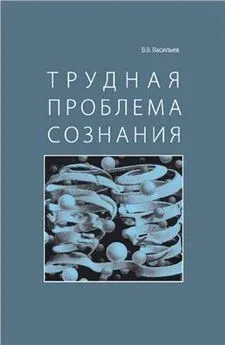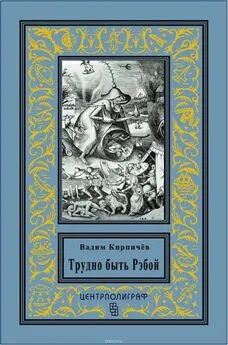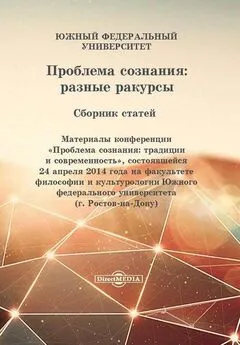Вадим Васильев - Трудная проблема сознания
- Название:Трудная проблема сознания
- Автор:
- Жанр:
- Издательство:Прогресс-Традиция
- Год:2009
- Город:Москва
- ISBN:978-5-89826-316-0
- Рейтинг:
- Избранное:Добавить в избранное
-
Отзывы:
-
Ваша оценка:
Вадим Васильев - Трудная проблема сознания краткое содержание
Книга посвящена обсуждению "трудной проблемы сознания" — вопроса о том, почему функционирование человеческого мозга сопровождается субъективным опытом. Рассматриваются истоки этой проблемы, впервые в четком виде сформулированной австралийским философом Д.Чалмерсом в начале 90-х гг. XX века. Анализируется ее отношение к проблеме сознание — тело и проблеме ментальной каузальности. На материале сочинений Дж. Серла, Д.Деннета, Д.Чалмерса и многих других аналитических философов критически оцениваются различные подходы к загадке сознания. В заключительной части книги автор предлагает собственное видение "трудной проблемы", позволяющее, с его точки зрения, избежать концептуальных тупиков и отдать должное интуициям здравого смысла
Трудная проблема сознания - читать онлайн бесплатно полную версию (весь текст целиком)
Интервал:
Закладка:
Hamad S. Minds, machines, and Searle 2: what's right and wrong about the Chinese Room Argument // Views into the Chinese Room: New Essays on Searle and Artificial Intelligence, ed. by J. Preston and M. Bishop. N. Y., 2002. P. 294–307. Hasker W. The Emergent Self. Ithaka, 2001 (1999).
Hauser L. Searle's Chinese Box: The Chinese Room Argument and Artificial Intelligence. Ph. D. Thesis. 1993. El. ed. http://members. aol.com/wutsamada/disserta.html.
Hawkins J., Blakeslee S. On Intelligence. N. Y., 2004.
Heidelberger M. Wie das Leib‑Seele Problem in den logischen Empirismus kam // Е — Journal Philosophie der Psychologie. 2 (2005). http://www.jp.philo.at/texte/HeidelbergerMl.pdf.
Heil J. Mental causation // The Blackwell Guide to Philosophy of Mind, ed. by S. P. Stich and T. A. Warfield. Maiden, 2003. P. 214–234.
Herrmann C. S., Pauen M., Mm В. К., Busch N. A., Rieger J. W. Eine neue Interpretation von Libets Experimenten aus der Analyse einer Wahlreaktionsaufgabe // Bewusstsein. Philosophie, Neurowissen‑schaften, Ethik, hrsg. v. C. S. Hermann, M. Pauen, J. W. Rieger und S. Schicktanz. Paderborn, 2005. S. 120–134.
Hissmann M. Psychologische Versuche. Em Beitrag zur esoteri‑schen Logik. Frankfurt am Main., 1777.
Hodgson D. The Mind Matters: Consciousness and Choice in a Quantum World. N. Y., 1991.
Hodgson D. The easy problems ain't so easy // Explaining Consciousness — The "Hard Problem", ed. by J. Shear. Cambridge MA, 1997. P. 125–131.
Hofstadter D., Dennett D. The Mind's I: Fantasies and Reflections on Self and Soul. N. Y., 2000 (1981).
Hofstadter D. I am a Strange Loop. N. Y., 2007.
Hogan T. Supervenient qualia // The Philosophical Review 96: 4 (1987). P. 491–520.
Horowitz A. Is there a problem in physicalist epiphenomenalism? // Philosophy and Phenomenological Research 59: 2 (1999). P. 421–434.
Humphrey N. How to solve the mind‑body problem // Journal of Consciousness Studies 7 (2000). P. 5–20.
Humphrey N. Seeing Red: A Study in Consciousness. Cambridge MA, 2006. Huxley T. On the hypothesis that animals are automata, and its history // Fortnightly Review (November 1874). P. 555–580.
Jackendoff R. Consciousness and the Computational Mind. Cambridge MA,
1987.
Jackson F. Epiphenomenal qualia // There's Something About Mary, ed. by P. Ludow, Y. Nagasawa, and D. Stoljar. Cambridge MA, 2004. P. 39–50.
Jackson F. From Metaphysics to Ethics: A Defence of Conceptual Analysis. N. Y., 1998.
Jackson F, Mind and illusion // There's Something About Mary, ed. by P. Ludow, Y. Nagasawa, and D. Stoljar. Cambridge MA, 2004. P. 421–442.
James W. Are we automata? // Mind 4 (1879). P. 1–22.
Kant 1. Gesammelte Schriften. Akademie‑Ausgabe. В., 1900ff.
Kenny A. The Metaphysics of Mind. Oxford, 1989.
Kim J. Epiphenomenal and supervenient causation // The Nature of Mind, ed. byD. Rosenthal. N. Y., 1991. P. 257–285.
Kim J "Strong" and "global" supervenience revisited // Supervenience and Mind: Selected Philosophical Essays, ed. by J. Kim. Cambridge, 1993. P. 79–91.
Kim J. Mental causation in Searle's "biological naturalism" // Philosophy and Phenomenological Research 55; 1 (1995). P. 189–194.
Kim J. The mind‑body problem: Taking stock after forty years // Philosophical Perspectives 11 (1997). P. 185–207.
Kim J. Mind in a Physical World. Cambridge MA, 1998.
Kim J. Physicalism, or Something Near Enough. Princeton, 2005.
Kim J. Philosophy of Mind. Cambridge MA, 2006.
Kim J. The Causal efficacy of consciousness // The Blackwell Companion to Consciousness, ed. by M. Velmans and S. Schneider. Maiden, 2007. P. 406–417.
King P. Why isn't the mind‑body problem medieval // Forming the Mind: Essays on the Internal Senses and the Mind/Body Problem from Avicenna to the Medical Enlightenment, ed. by H. Lagerlund. Dordrecht, 2007. P. 187–206.
Kirk R. Sentience and behaviour // Mind 83 (1974). P. 43–60.
Kirk R. "The best set of tools"? Dennett's metaphors and the mind‑body problem // The Philosophical Quarterly 43:172 (1993). P. 335–343.
Kirk R. Zombies and Consciousness. N. Y., 2005.
Kitcher P. Kant's Transcendental Psychology. N. Y., 1990.
Koch С The Quest for Consciousness: A Neurobiological Approach. Englewood, 2004.
Koksvik O. In Defence of Interactionism. Master thesis. TS 2006.
Kriegel U., Wllliford K. (eds) Self‑Representational Approaches to Consciousness. Cambridge MA, 2006.
Kripke S. Naming and Necessity. Cambridge MA, 1980.
Kripke S. Wittgenstein on Rules and Private Language. Cambridge MA, 1982.
Kuczynski J. — M. M. A quasi‑materialist, quasi‑dualist solution to the mind- body problem // Criterion 109 (2004). P. 81–135.
Lacks J. Epiphenomenalism and the notion of cause // The Journal of Philosophy 60 (1963). P. 141–146.
Leopold D. A., Logothetis N. K. Activity changes in early visual cortex reflects monkeys' percepts during binocular rivalry // Nature 379 (1996). P. 549–553.
Levine J. Purple Haze: The Puzzle of Consciousness. N. Y., 2004 (2001).
Levine J. Anti‑materialist arguments and influential replies // The Blackwell Companion to Consciousness, ed. by M. Velmans and S. Schneider. Maiden, 2007. P. 371–380
Lewis С. I. Mind and the World‑Order: Outline of a Theory of Knowledge. N. Y., 1929.
Lewis D. An argument for the identity theory // Journal of Philosophy 63: 1 (1966). P. 17–25.
Lewis D. Philosophical Papers. V. II. N. Y., 1986.
Lewis D. Mad pain and Martian pain // The Nature of Mind, ed. by D. Rosenthal. N. Y., 1991. P. 229–234.
Lewis D. What experience teaches // There's Something About Mary: Esays on Phenomenal Consciousness and Frank Jackson's Knowledge Argument, ed. by P. Ludow, Y. Nagasawa, and D. Stoljar. Cambridge MA, 2004. P. 77–103.
Libet B. Solutions to the hard problem of consciousness // Explaining Consciousness — The "Hard Problem", ed. by J. Shear. Cambridge MA, 1997. P. 301303.
Libet B. Mind Time: The Temporal Factor in Consciousness. Cambridge MA,
2004.
Loar B. Phenomenal states // The Nature of Consciousness: Philosophical Debates, ed, by N. Block, O. Flanagan, and G. Guzeldere. Cambridge MA, 1997. P. 597–616.
Lowe E. J. There are no easy problems of consciousness // Explaining Consciousness — The "Hard Problem", ed. by J. Shear. Cambridge MA, 1997. P. 117123.
Lowe E. J. Causal closure principles and emergentism // Philosophy 75: 4 (2000). P. 571–585.
Malcolm N. Knowledge of other minds // The Nature of Mind, ed. by D. Rosenthal. N. Y., 1991. P. 92–97.
Marcus E. Mental causation: Unnaturalized but not unnatural // Philosophy and Phenomenological Research 61:1 (2001). P. 57–83.
Marras A. Methodological and ontological aspects of the mental causation problem // Physicalism and Mental Causation: The Metaphysics of Mind and Action, ed. by S. Walter and H. — D. Heckmann. Exeter, 2003. P. 243–264.
Marsoobian А. Т., Ryder J. (eds) The Blackwell Guide to American Philosophy. Maiden, 2004.
McGinn С The Problem of Consciousness: Essays Towards a Resolution. Oxford, 1993(1991).
McGinn C. Problems in Philosophy: The Limits of Inquiry. Maiden, 1993. McGinn C. Consciousness evaded: Comments on Dennett // Philosophical Perspectives 9 (1995). P. 241–249.
McGinn C. Character of Mind: An Introduction to the Philosophy of Mind. New ed. N. Y., 1996.
McGinn C. Can we solve the mind‑body problem? // The Nature of Consciousness: Philosophical Debates, ed. by N. Block, O. Flanagan, and G. Guzeldere. Cambridge MA, 1997. P. 529–542.
McGinn C. The Mysterious Flame: Conscious Minds in a Material World. N. Y., 1999.
McGinn C. The Making of a Philosopher: My Journey through Twentieth- Century Philosophy. N. Y., 2003 (2002).
McGinn C. Consciousness and Its Objects. N. Y., 2004.
McGinn C. Hard questions // Strawson G. et al. Consciousness and Its Place in Nature: Does Physicalism Entail Panpsychism? Charlottesville, 2006. P. 90–99.
McKinsey M. Refutation of qualia‑physicalism // Situating Semantics: Essays on the Philosophy of John Perry, ed. by M. O'Rourke and Corev Washington. Cambridge MA, 2007. P. 469–498.
McLaughlin B. P. Type epiphenomenalism, type dualism, and the causal priority of the physical // Philosophical Perspectives 3 (1989). P. 109–135.
Meixner U. New perspectives for a dualistic conception of mental causation // Journal of Consciousness Studies 15: 1 (2008). P. 17–38.
Melloni L. et al. Synchronization of neural activity across cortical areas correlates with conscious perception // The Journal of Neuroscience 27: 11 (2007). P. 2858–2865.
Menzies P. Counterfactual theories of causation: Entry in the Stanford Encyclopedia of Philosophy, 2001. http://plato. Stanford, edu/entries/causationcounterf actual.
Menzies P. The causal efficacy of mental states // Physicalism and Mental Causation: The Metaphysics of Mind and Action, ed. by S. Walter and H. — D. Heckmann. Exeter, 2003. P. 195–223.
Meyer M. The Present status of the problem of the relation between mind and body // The Journal of Philosophy, Psychology and Scientific Methods 9: 14(1912). P. 365–371.
Mills E. O. Giving up on the hard problem of consciousness // Explaining Consciousness — The "Hard Problem", ed. by J. Shear. Cambridge MA, 1997. P. 109115.
Mohrhoff U. Interactionism, energy conservation, and the violation of physical laws // Physics Essays 10: 4 (1997). P. 651–665.
Monk R. Ludwig Wittgenstein: The Duty of Genius. N. Y., 1991 (1990). Montero B. Varieties of causal closure // Physicalism and Mental Causation: The Metaphysics of Mind and Action, ed. by S. Walter and H. — D. Heckmann. Exeter,
2003. P. 173–187.
Montero B. What does the conservation of energy have to do with physicalism? // Dialectica 60: 4 (2006). P. 383–396.
Moore G. E. Some Main Problems of Philosophy. N. Y., 1962 (1953).
Moural J. The Chinese Room Argument // John Searle, ed. by B. Smith. Cambridge, 2003. P. 214–260.
Muijnck W. Dependencies, Connections, and Other Relations: A Theory of Mental Causation. Dordrecht, 2003.
Muijnck W. Two types of mental causation // Philosophical Explorations, 7:1 (2004). P. 21–35.
Nagel T. Brain bisection and the unity of consciousness // Synthese 22(1971). P. 396–413.
Nagel T. What is it like to be a bat? // Philosophical Review 83: 4 (1974). P. 435–450.
Nagel T. The View From Nowhere. N. Y., 1986.
Nagel T. Other Minds: Critical Essays. 1969–1994. N. Y., 1995.
Papineau D. Thinking about Consciousness. N. Y., 2004 (2002).
Parfit D. Personal identity // Personal Identity, ed. by J. Perry. Berkeley, 1975. P. 199–223.
26
5Parfit D. Reasons and Persons. N. Y., 1986 (1984).
Passingham R. E., Lau H. C, Free choice and the human brain // Does Consciousness Cause Behavior? Ed. by S. Pocketi, W. P. Banks and S. Gallagher. Cambridge MA, 2006. P. 53–72.
Patten M., Staudacher A., Walter S. Epiphenomenalism: Dead end or way out? // Journal of Consciousness Studies 13: 1–2 (2006). P. 7–19.
Pauen M. Was ist der Mensch? Die Entdeckung der Natur des Geistes. Mtinchen, 2007.
Pinker S. How the Mind Works. L., 1999(1997).
Pinker S. The Blank Slate: The Modern Denial of Human Nature. N. Y.,2002. Pinker S. So how does the mind work? // Mind & Language 20:1 (2005). P. 124.
Pinker S- The Stuff of Thought: Language as a Window into Human Nature. N. Y., 2007.
Place U. T. Is consciousness a brain process? // British Journal of Psychology 47 (1956). P. 44–50.
Place U. T. Token— versus type‑identity physicalism // Antropology and Philosophy 3: 2 (1999). P. 21–31.
Читать дальшеИнтервал:
Закладка:








